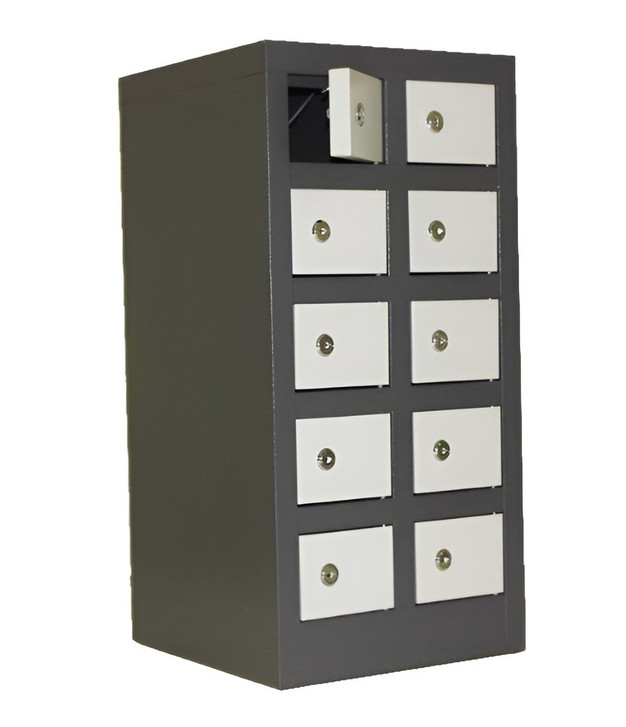Why the Difference Matters
Choosing between a locker supplier and a locker manufacturer directly impacts uptime, compliance, and budget. In South Africa’s busy warehousing, retail, healthcare, and education sectors, the wrong choice can lead to delays, rework, or compliance gaps.
At Dreymar Industrial, we help operations teams align locker strategies with broader storage goals, tying lockers into racking, shelving, and materials handling so facilities run leaner, safer, and more efficiently.
Key Takeaways
- Supplier vs Manufacturer: Suppliers focus on multi-site rollouts, bundled sourcing, and fast availability. Manufacturers' own design, fabrication, and deep customisation.
- Choose a supplier when you need speed, standardisation, and nationwide “lockers near me” coverage.
- Choose a manufacturer when you need bespoke dimensions, coatings, traceability, and direct quality control.
- Compliance first: Always verify load ratings, corrosion tests, material certifications, and batch tracking - critical in healthcare, education, and food-grade zones.
- Lifecycle matters: Insist on site surveys, anchoring proofs, spares matrices, and SLAs to reduce downtime and lower long-term costs.
- Supply resilience: Confirm capacity, dual sourcing, and standardised parts to keep rollouts on schedule across South African operations.
Supplier vs Manufacturer: Roles and Capabilities
What a Locker Supplier Does
- Sources lockers from multiple factories
- Matches specs, lead times, and budgets to your site needs
- Integrates lockers into wider storage systems (racking, shelving, access gear)
- Bundles lockers with cabinets and bins for simpler procurement
- Provides nationwide rollout capacity and “lockers near me” availability
What a Locker Manufacturer Does
- Designs, fabricates, and finishes lockers in-house
- Customises dimensions, coatings, and door configurations
- Controls QA from raw material intake through finishing
- Provides full traceability (steel grades, coatings, batch numbers)
- Delivers single-point accountability for warranties and defects
How the Choice Affects Your Project
Customisation and Control
- Manufacturer fit: bespoke sizes, antimicrobial coatings, airflow panels, or high-corrosion finishes.
- Supplier fit: standard footprints and sizes for rapid rollout across multiple sites.
Compliance and QA
- Manufacturer: in-house testing, full traceability, QA packs.
- Supplier: multi-vendor test reports, certificates, and installation statements.
Cost and Lead Times
- Suppliers: lower MOQs, faster availability, pooled stock.
- Manufacturers: longer lead times, higher MOQs, but greater depth in customisation and compliance.
Service and Support
Both should offer:
- Site surveys and anchoring proofs
- SLAs for maintenance and spares
- Handover packs with safety documentation
Use Cases
- Small Offices: suppliers offer fast, standard solutions for hot-desking, breakrooms, or reception storage.
- Healthcare & Education: manufacturers provide custom antimicrobial finishes, traceability, and compliance depth for audits.
- Warehousing & Retail: suppliers excel in coordinating lockers with racking and shelving across multiple depots or outlets.
Conclusion
The right locker partner depends on your priorities:
- Supplier for speed, national coverage, and simplified procurement.
- Manufacturer for control, compliance depth, and engineered quality.
At Dreymar, we help you benchmark both paths, validate specs, and integrate lockers into a full storage strategy.
Frequently Asked Questions
- What’s the main difference between a locker supplier and a locker manufacturer?
A supplier sources lockers from multiple factories for fast rollouts. A manufacturer designs and produces lockers in-house with full quality control and customisation. - When should I choose a supplier over a manufacturer?
Suppliers are best for standardised units, multi-site rollouts, and quick lead times. Manufacturers suit custom designs, compliance-heavy projects, or unique site requirements. - How do lockers affect uptime and costs in South African operations?
Correctly specified lockers reduce downtime, improve stock flow, and ensure compliance. This protects both budget and performance over the lifecycle. - What compliance checks should I ask for?
Look for load ratings, corrosion test results, material certifications, and proper anchoring proofs. In high-risk sectors (healthcare, food), insist on traceability packs. - Do suppliers and manufacturers both handle after-sales support?
Yes, but differently. Suppliers manage service through networks of installers and spare parts vendors. Manufacturers usually provide direct part replacements and long-term warranty accountability.

